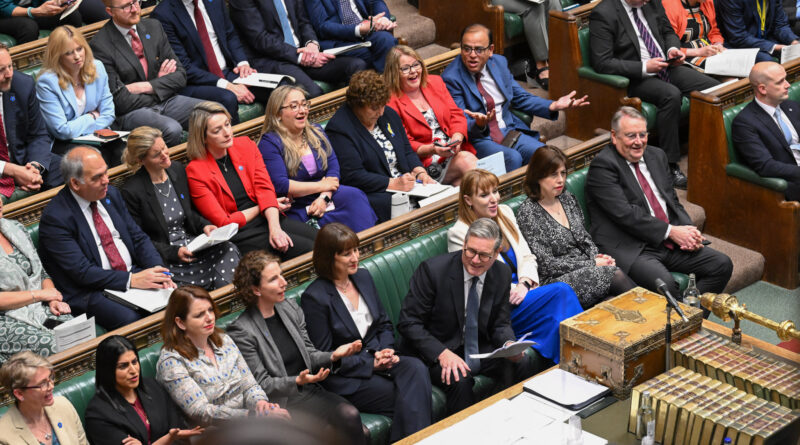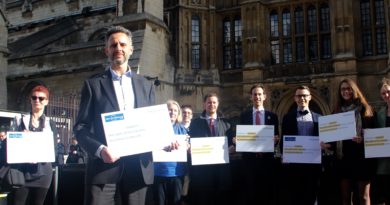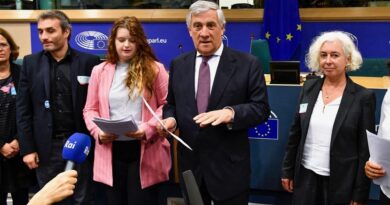New UK government: 5 things to know about the ‘reset’ of the EU relationship
After the Labour party victory in the general election, the new government led by Keir Starmer immediately launched a ‘reset’ of the relationship with the European Union.
Analysts say that rebuilding trust after the bitter years of Brexit will require time, and getting closer to the EU does not mean aiming to re-join. But the first days in office have shown that the new government is making the relationship with the EU a priority. These are five things to know about it and what happens next.
1. The composition of the new Cabinet
All members of the new Cabinet supported remaining in the EU in the 2016 referendum, according to the Daily Mail (compared to 60% of the Rishi Sunak cabinet). Several members also took an active role during the Brexit negotiations to avoid the most damaging impacts of the withdrawal from the bloc.
Prime Minister Keir Starmer himself was the Shadow Brexit Secretary, questioning the government approach to Brexit, between October 2016 and April 2020.
Nick Thomas-Symonds, appointed Paymaster General and Minister for the Constitution and European Relations, was Shadow Home Secretary from 2020 to 2021. He challenged the secrecy of the Attorney General legal advice on Prime Minister Theresa May’s Brexit deal, which did not pass in parliament. At a meeting with business leaders last year, he said the Labour government would “fix holes” in the EU-UK trade and cooperation agreement signed in 2020.
His first call in the new role was with Commission Executive Vice-President Maroš Šefčovič, who is in charge of talks with the UK. The two will meet on Monday 15 July in Brussels.
Yvette Cooper, the new Home Secretary, was the chair of the House of Commons home affairs select committee from 2016 to 2021, the entire period of the Brexit negotiations. Cooper tabled several proposals to avoid no-deal Brexit and to protect the rights of EU citizens in the UK, urging from the outset legislation guaranteeing their legal status regardless of the Brexit outcomes.
Hilary Benn, appointed Secretary of State for Northern Ireland, was the chair of the House of Commons Brexit select committee from 2016 to 2021 and supported the rights of EU citizens in the UK. He also sponsored legal acts that would have obliged the Prime Minister to seek an extension of the Brexit date in case of no agreement with the EU.
Now they all exclude re-joining the single market or the EU customs union and restoring free movement of people with the EU, but they say the UK should have a closer cooperation with the bloc.
2. Ursula von der Leyen among the first people Keir Starmer talked to
As the new Prime Minister, Keir Starmer had the first three calls on Friday 5 July with US President Joe Biden, Ukrainian President Volodymyr Zelenskyy and European Commission President Ursula Von der Leyen.
“The leaders discussed areas of close cooperation between the UK and the EU, including support for Ukraine, climate change and regional security,” a Downing Street spokeswoman said after the call with von der Leyen.
Starmer also spoke with a number of EU leaders in his first days in office. With Irish Taoiseach Simon Harris, he expressed the “total commitment” to protect the Good Friday Agreement, which secures peace in Northern Ireland but was threatened by Brexit.
3. Key themes for the collaboration
Security, support to Ukraine, climate change, migration and artificial intelligence were the key topics emerging from Keir Starmer’s conversations with EU leaders.
With Italian Prime Minister Giorgia Meloni, who holds the G7 presidency this year, he agreed “on the importance of close collaboration on shared challenges, such as migration and support for Ukraine.”
Ukraine and “defence and security ties” were also at the centre of calls with the Polish Prime Minister Donald Tusk and with German Chancellor Olaf Scholz.
“Shared priorities” discussed with French President Emmanuel Macron include “the conflicts in Ukraine and the Middle East, climate, artificial intelligence, migration and the economy.”
In his second day in government, Foreign Secretary David Lammy travelled to Germany, Poland and Sweden to meet his counterparts. The UK is seeking a security pact with the EU, with a “joint declaration” that would concern defence, energy, climate change, pandemics and illegal migration, The Guardian reported.
The same topics appeared in EU leaders’ congratulation messages to Starmer. “As close friends and Allies, I am looking forward to working with you to enhance our common security and prosperity,” said Swedish Prime Minister Ulf Kristersson.
Former EU chief Brexit negotiator Michel Barnier commented: “A new era can begin between the European Union & the United Kingdom. Let’s make it fruitful. We have so many challenges to address, together: peace, cooperation in Africa, security, AI. The relationship between the European Union and the United Kingdom is rooted in our shared values and longstanding friendship. As allies and partners, it is in our common interest to continue working closely together.”
4. “Ties between our people”
David Lammy also wrote in an opinion piece in The Local: “We must do more to champion the ties between our people and our culture. Holidays, family ties, school and student exchanges, the arts, and sport.”
Among the topics discussed during the visit to Poland with Foreign Minister Radosław Sikorski, there was the teaching of the Polish language in British schools, Londynek reports. Around 700,000 of the five million EU citizens living in the UK are Polish.
The European Commission recently proposed an agreement to ease rules on mobility between the UK and the EU for young peopl between the age of 18 and 30, allowing them to work, study and live in the respective countries for up to four years with a special visa and limited restrictions. Several EU decision-makers would also like the UK to rejoin the Erasmus student exchange programme. But these links do not appear in the Labour party electoral manifesto.
The manifesto promised to “reduce net migration” and to reform the points-based immigration system set up after Brexit, but maintain the ban on students’ family members for instance.
Although Brexit is estimated to cost 4% of UK GDP per year, the Labour manifesto also said “there will be no return to the single market, the customs union, or freedom of movement”.
Labour instead will work to “improve trade and investment with the EU, negotiate a veterinary agreement to prevent unnecessary border checks and help tackle the cost of food; help UK touring artists; and secure a mutual recognition agreement for professional qualifications to help open up markets for UK service exporters.”
5. What happens next
Jake Benford, Senior Project Manager at the Bertelsmann Foundation in Germany, wrote in a blog post: “Decisions made by any new government post-election will be observed carefully in Brussels and national capitals, with a view to discerning Westminster’s concrete offers and overall posture towards the EU, as it engages in its very own challenge of carving out a role in a changing European and global order.”
“A moderate government in Downing Street that looks towards Europe raises hopes that British resilience and resurgence can contribute to more European unity in a geopolitical world. Yet barriers to reconnecting with the EU remain, and the surge in support for Reform, a populist protest party, is a reminder that British politics remains volatile,” Benford said.
In these elections, Labour won 412 seats with 9.6 million votes, while the Conservatives obtained 121 with 6.7 million votes and Reform UK, the pro-Brexit party, won 4 seats with 4 million votes. The Tories did not win any constituency in Central London, but Brexit leader Nigel Farage won his seat in Westminster for the first time.
European Commission chief spokesman Eric Mamer said it is for the UK “to say what it is that it wants in terms of making this relationship move forward” reminding that “the agreements that we signed were based on a series of red lines that had been set at the time by the United Kingdom”.
Benford argues that “a starting point towards resetting EU-UK relations would be for both sides to quickly define shared strategic priorities and strengthen the institutional backbone of cooperation”. This would include establishing EU-UK summits and “specially designated working groups”.
To know more about the new relationship, a key date will be Wednesday 17 July, with the official opening of the UK parliament and the King’s Speech setting out the policies of the new government.
On Tuesday 16 July the European Parliament will hold its constitutive session in Strasbourg. The election of the European Commission President, with Ursula von der Leyen candidate for a second term, is planned on Thursday 18 July.
Also on 18 July, the UK will host more than 45 European leaders for the fourth meeting of the European Political Community, a broader ‘club’ than the European Union.
According to The Guardian, David Lammy has already accepted an invitation from the EU representative on foreign affairs Josep Borrell to attend the EU foreign affairs Council meeting in October, an invitation that was rejected by his predecessors.
Claudia Delpero, Europe Street News © all rights reserved
Photo © House of Commons
Europe Street News is a news service on the European Union and citizens’ rights. We are fully independent and we are committed to providing factual, accurate and reliable information. As citizens’ rights are at the core of democracy, our website and newsletter are free to read. Please consider making a contribution of your choice using this link or the menu below so we can continue and expand our coverage. We are always happy to hear your suggestions and ideas for improvement. Thank you!




